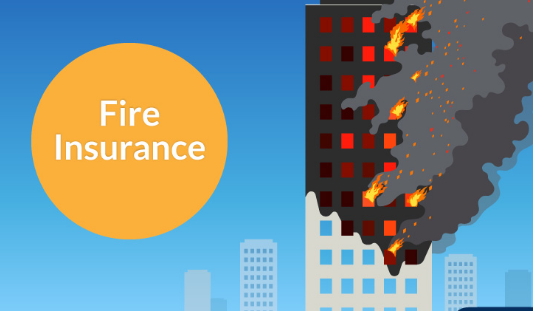Fire insurance is a type of property coverage that pays for damages and other losses you may incur in a fire. It covers the cost of repairing or replacing damaged property in your home, as well as living costs if you need to move while your home is unusable.
Fire insurance is a type of property coverage that pays for damages and other losses you may suffer from a fire. It covers the cost of repairing or replacing damaged property in your home, as well as living costs if you need to move while your home is unusable.
Learn more about how fire insurance works and whether your property is covered in an emergency or accident.
Definition and Example of Fire Insurance
Fire insurance covers the cost of damage to your property due to fire. It also includes your personal belongings and room and board expenses above and beyond your normal living expenses, up to the limits of your policy. You are subject to the same deductible and coverage limits as the rest of your policy.
Any prominent structures on your land, such as sheds, fences, or detached garages, are also often covered. Some policies will also help pay for landscaping costs, such as damage to trees and shrubs.
How Fire Insurance Works
You must file a claim with your insurance company to get coverage for fire damage to your property. Be sure to take photos of all damage to document your claim. The company will send a claims adjuster to your home to assess the damage. Check your ID when they arrive, because scams happen. Walk them around your property to make sure they see everything. If you have photos from before the damage, it might be helpful to provide them.
Review the estimate when you receive it from your insurer. Compare it to your policy terms to make sure it matches what you paid for.
The homeowner’s policy will pay for damage to your home up to the policy limits for fire damage. But most policies exclude damage from war, nuclear radiation and other associated hazards.
Damages will not be covered if a homeowner intentionally burns down their home. Damage to an unoccupied dwelling is also not covered, at least not if the dwelling has been unoccupied for more than 30 consecutive days at the time of the fire. You can buy a “vacant homeowners insurance policy” if you want to cover a house you are not living in.
Your policy may also exclude other events or charge higher premiums for them, depending on where you live. You may be subject to certain limits if you live in an area with a high risk of wildfires.
You may purchase additional fire insurance in addition to your homeowners policy to cover damage not covered by your standard policy.
Types of Fire Insurance
Business owners with tangible property may not need fire insurance. Fire damage to a business is usually covered under the business owner’s basic policy. This includes damage to your building, attached and detached structures, office equipment and inventory.
Most homeowners policies will also pay additional operating expenses if you need to move your business to a temporary location. Keep an up-to-date inventory of business equipment and other valuable items. You should also keep vital documents off-site so they are not destroyed in a fire.
Do I Need Fire Insurance?
Your home is one of your most important investments. Home insurance that includes fire insurance can protect you from financial disaster.
Having fire insurance can become even more important depending on where you live. Areas like California, for example, have seen an increase in wildfires in recent years. The area burned by California wildfires each year has increased since 1950, and eight of the state’s 20 largest wildfires have occurred since 2017.
If you have a mortgage, your lender will require you to purchase homeowners insurance if you have a mortgage. But it’s nice to have it in place, even if you own your house free and clean. Insurance will protect your finances and assets in the event of a disaster, even if you have the full value of your home.
Homeowners insurance is a must unless you can cover the costs of rebuilding your home and replacing your pocket-sized belongings. Make sure yours includes fire insurance so that you are protected in any kind of emergency.

